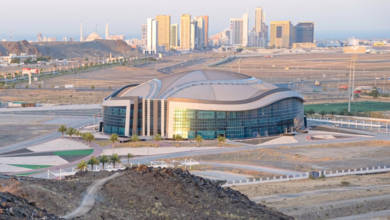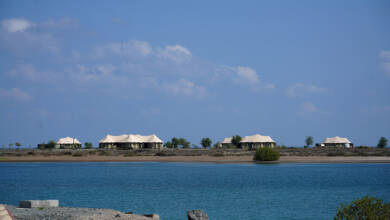Abu Dhabi’s new border rules to curb the spread of Covid-19
Commuters will no longer be able to take only laser blood tests to prove they are virus free
Abu Dhabi is tightening the rules for people entering the emirate from Thursday.
The capital first introduced a system to allow commuters to cross the border at the end of June. Drivers and passengers were permitted to pass through if they could show a negative Covid-19 test result.
Initially, only polymerase chain reaction (PCR) swab test results were accepted but later people were allowed to enter with results from a cheaper diffractive phase interferometry (DPI) laser test, which cost just Dh50.
That has changed from Thursday, August 27.
People entering Abu Dhabi from the Dubai border will no longer be able to use the laser test alone.
They either need:
A negative PCR result, taken within the previous 48 hours; or a negative laser test result within the last 48 hours, accompanied by a PCR test result, which must have been received within the last six days.
The same test cannot be taken twice in a row within a six-day period.
Daily commuting is not encouraged by authorities but if a person’s job depended on it, it is possible. To ensure they could pass through the border every week day, they would have to take a PCR test on a Friday to give them enough time to receive the result by Saturday or Sunday.
Once they have it, they then have 48 hours to cross the border. If driving to Abu Dhabi on Tuesday, they could take a DPI test, which will essentially refresh the swab test result, giving them another 48 hours, up to Thursday, to cross the border.
Why have authorities introduced this change?
It is part of strengthened measures to curb the spread of Covid-19. On Tuesday, authorities said cases had risen by 10 per cent since the start of August.
What is the difference between the two tests?
The PCR test is considered the “gold standard” for Covid-19 diagnosis. It works by taking a sample from the throat or nose. Scientists then strip it down in a laboratory to detect the virus’s genetic material. This test is more laborious, and expensive, at about Dh370.
For the laser test, medics take a drop of blood that is analysed using a laser beam of light. It looks for changes in blood cells. A healthy person’s blood cell is perfectly round, but scattered in unhealthy cells. The image is then compared to thousands of others using an algorithm. The team behind the device said it proved 85 to 90 per cent accurate in tests.
Source: The National





